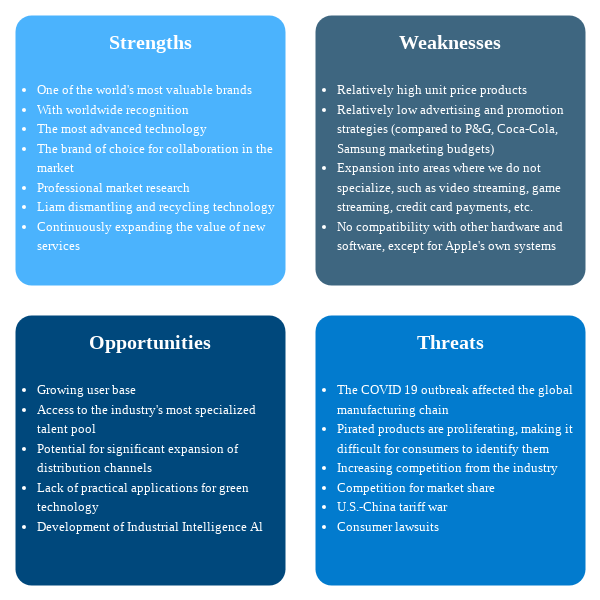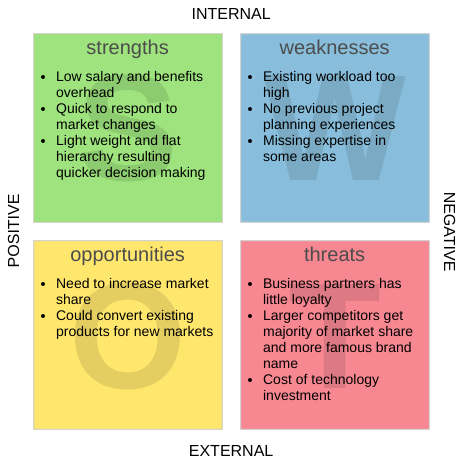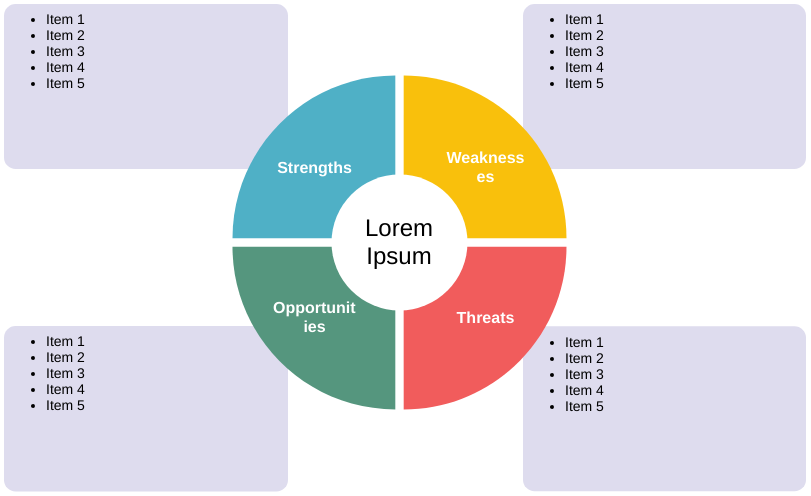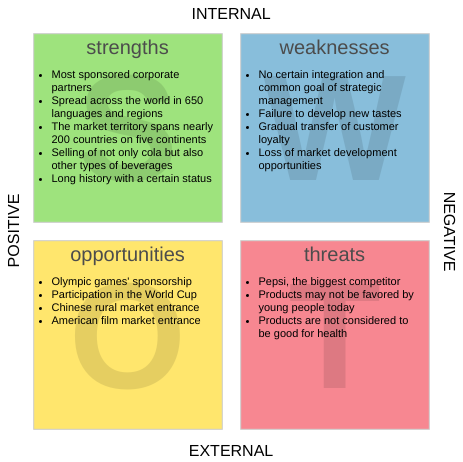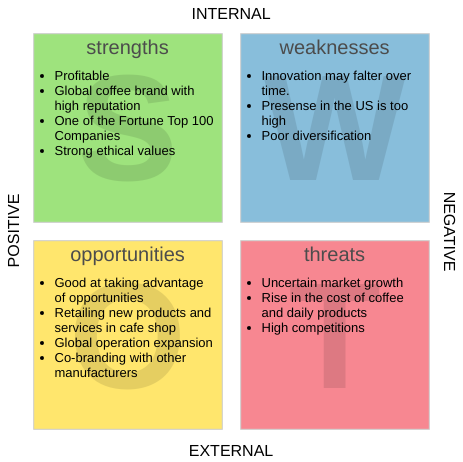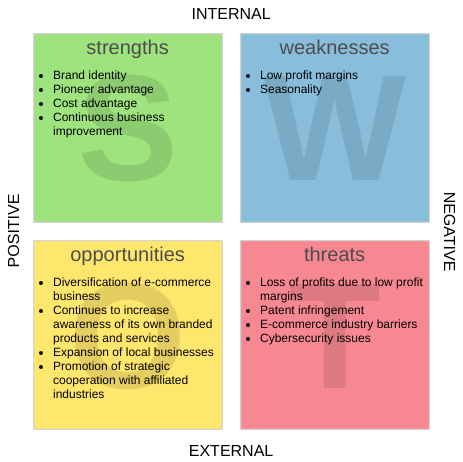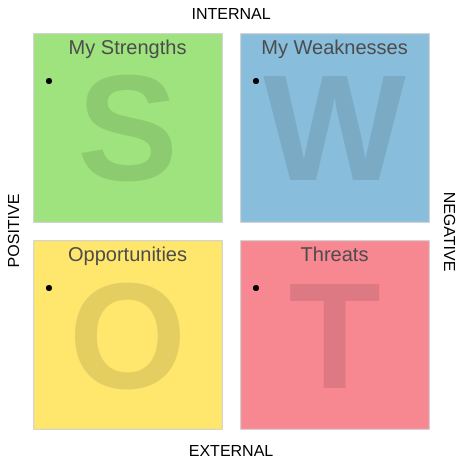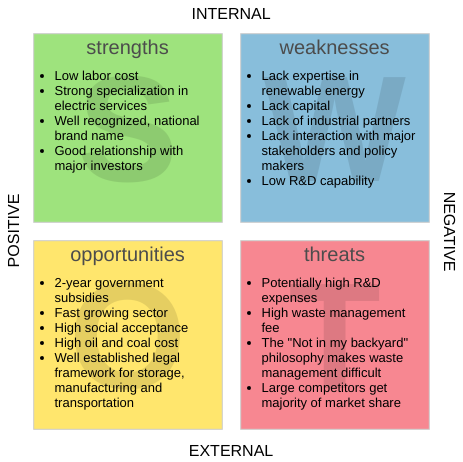Czym jest analiza SWOT?
analiza SWOT jest najczęściej stosowaną metodą analizy rynku w biznesie i akademii do oceny wewnętrznych mocnych i słabych stron firmy, a także możliwości i zagrożeń ze strony zewnętrznych konkurentów poprzez burzę mózgów.
Analiza SWOT reprezentuje Mocne strony, Słabe strony, Możliwości i Zagrożenia. Ta struktura analizy pomaga firmom ocenić swoją pozycję konkurencyjną i sformułować plany strategiczne.
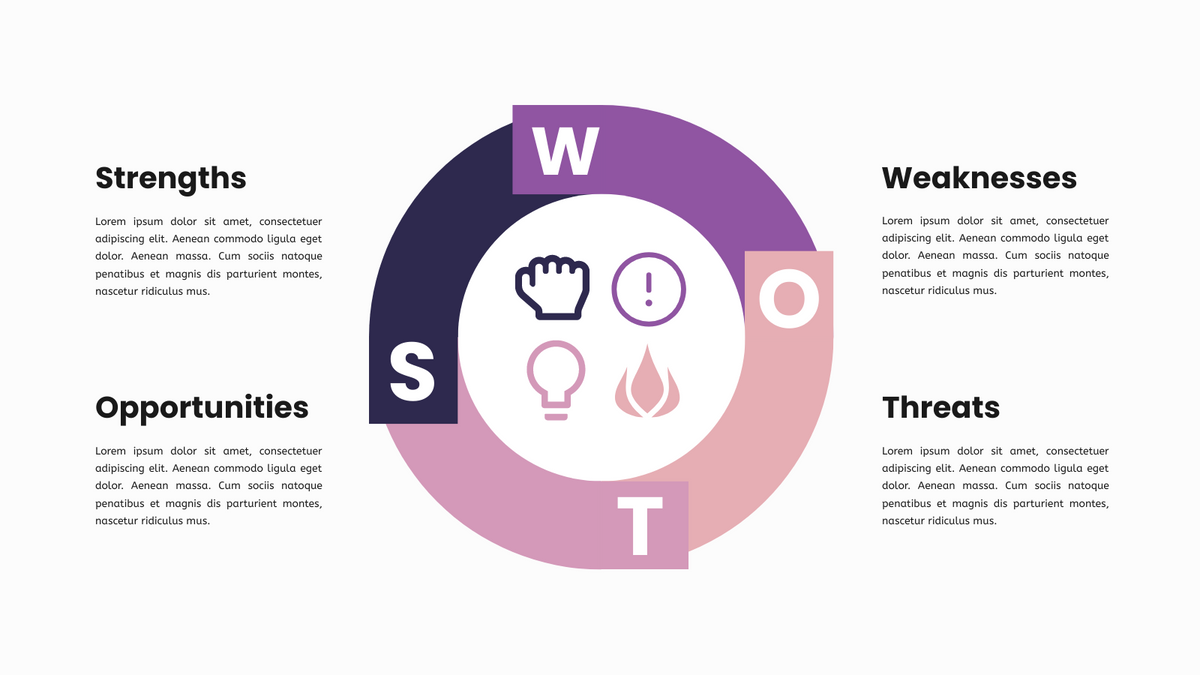
- Mocne strony: Obszary, w których firma wyróżnia się na tle konkurencji. Przykłady to silna marka, lojalna baza klientów, unikalna technologia itp.
- Słabe strony: Co powstrzymuje firmę przed osiągnięciem najlepszych wyników, to obszary, w których firma musi się wzmocnić. Przykłady to słaba reputacja marki, wysokie poziomy zadłużenia, niewystarczająca sieć dostaw, niewystarczający kapitał itp.
- Możliwości: Zewnętrzne czynniki, które mogą dać firmie przewagę konkurencyjną. Na przykład, jeśli kraj ogłosi obniżenie ceł, producenci samochodów będą mogli eksportować samochody na nowe rynki i zwiększyć sprzedaż oraz udział w rynku.
- Zagrożenia: To czynniki, które mogą zaszkodzić firmie. Do powszechnych zagrożeń należą rosnące koszty surowców, niewystarczająca podaż pracy oraz zwiększona konkurencja.
Skąd pochodzi analiza SWOT?
SWOT jest metodą analizy rynku zaproponowaną przez profesora Heinza Weihricha z Uniwersytetu w San Francisco w 1980 roku. SWOT to siatka czterech kwadratów, w której podsumowane są mocne strony, słabe strony, możliwości i zagrożenia firmy, a następnie proponowane są konkretne plany działania na podstawie wyników analizy SWOT.
Wnioski SWOT dla menedżerów
Menedżerowie mogą rozwijać podstawową analizę SWOT, łącząc pracowników z różnych działów, w tym sprzedaży, obsługi klienta, marketingu i rozwoju produktu, aby opracować bardziej szczegółowy raport dotyczący wglądu w biznes.
Jednakże, ponieważ świat biznesu zawsze się zmienia, najlepiej jest, aby menedżerowie przeprowadzali nową analizę SWOT co 6 do 12 miesięcy, aby nieprzerwanie oceniać kierunek rozwoju strategii w odpowiedzi na zmiany zewnętrzne.
Analiza SWOT: Coca-Cola
Mocne strony
- Świadomość marki: Coca-Cola jest jedną z najbardziej rozpoznawalnych marek na świecie i zbudowała lojalną bazę konsumentów. Dzięki dużemu udziałowi w rynku dysponuje bardzo silnymi zasobami finansowymi i jest w stanie prowadzić ogromne inicjatywy marketingowe lub innowacje produktowe, aby utrzymać lub zwiększyć swój udział w rynku.
- Sieć dostaw: Coca-Cola dostarcza napoje do ponad 200 krajów poprzez silną sieć dostaw składającą się z dystrybutorów kontrolowanych przez firmę, niezależnych rozlewni, hurtowników i detalistów. Ta sieć pozwala również Coca-Coli szybko wprowadzać nowe produkty na różne rynki, aby zdobyć udział w rynku.
Słabe strony
- Zarządzanie wodą: Woda jest kluczowym składnikiem wszystkich produktów Coca-Coli. Jednakże, zapotrzebowanie na wodę wciąż rośnie na całym świecie, a zasoby wodne stają się coraz bardziej ograniczone. Ogólna jakość dostępnych źródeł wody może się pogorszyć, narażając Coca-Colę na wyższe koszty i negatywnie wpływając na rentowność.
- Wahania kursów walut: Ponieważ skonsolidowane sprawozdania finansowe Coca-Coli są denominowane w dolarach amerykańskich, musi przeliczać przychody, wydatki, aktywa i zobowiązania na dolary amerykańskie. Nagła i znaczna deprecjacja walut krajów rozwijających się lub rynków wschodzących może negatywnie wpłynąć na zyski firmy, a także na jej aktywa na tych rynkach.
Możliwości
- Dywersyfikacja: Coca-Cola kupiła Keurig Green Mountain, część Monster Beverage, producenta napojów energetycznych, a w zeszłym roku (2018) kupiła Costa, brytyjską sieć kawiarni (czytaj więcej: Coca-Cola stawia czoła Starbucksowi, 5,1 miliarda dolarów za rywala Starbucks, Costa). (Czytaj więcej: Coca-Cola stawia czoła Starbucksowi w umowie o wartości 5,1 miliarda dolarów, aby rywalizować z Costą, gdy wojna kawowa wkracza w erę wielkich sojuszy) Coca-Cola może wykorzystać te inwestycje, aby wejść na różne rynki napojów i dotrzeć do szerszej bazy klientów.
- Rozszerzenie zasięgu: Indie i Chiny, na przykład, obserwują rosnące zapotrzebowanie na soki owocowe i kawę, podczas gdy kraje rozwijające się borykają się z poważnymi niedoborami wody i wzrostem zapotrzebowania na wodę butelkowaną. Te trendy w konsumpcji napojów mogą stanowić szansę dla Coca-Coli.
Zagrożenia
- Zdrowy styl życia zyskuje na znaczeniu: W miarę jak coraz więcej konsumentów zwraca się ku produktom naturalnym i organicznym oraz staje się bardziej świadomych diety i fitnessu, ten kulturowy zwrot nie wydaje się osłabiać. Również w wyniku trendu zdrowego stylu życia niektórzy eksperci wzywają do eliminacji słodkich produktów spożywczych i napojów, które, jak twierdzą, narażają ogół społeczeństwa na wysokie ryzyko otyłości, cukrzycy i chorób serca.
- Konkurenci pośredni: Chociaż firmy takie jak Starbucks czy Dunkin’ Brands Group nie konkurują bezpośrednio z Coca-Colą, mogą podważać udział Coca-Coli w rynku, oferując konsumentom zdrowsze alternatywy.
Oprogramowanie do analizy SWOT
Visual Paradigm Online to znakomite narzędzie do tworzenia wykresów. Jego edytor analizy SWOT zawiera intuicyjny edytor danych oparty na liście, który pozwala szybko i łatwo wypełniać wykresy SWOT. Visual Paradigm Online oferuje również dużą kolekcję wykresów biznesowych i technicznych, zapewniając setki przykładów wykresów i szablonów, które pozwalają szybko tworzyć własne wykresy. Wersja darmowa Visual Paradigm Online jest dostępna do użytku niekomercyjnego i obsługuje UML, ERD oraz projektant diagramów organizacyjnych.
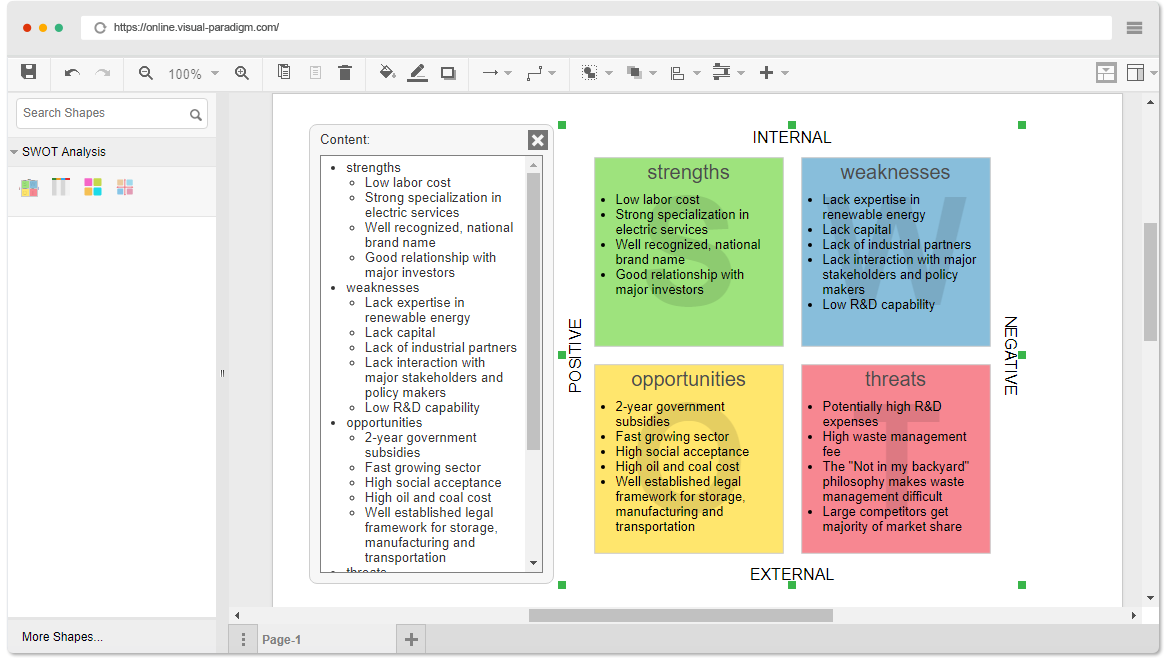
Powiązane linki
* Analiza SWOT jest wspierana przez technologię internetową Visual Paradigm. Możesz ją stworzyć zarówno wVisual Paradigm Desktop i Visual Paradigm Online.
więcej
Więcej przykładów i szablonów SWOT
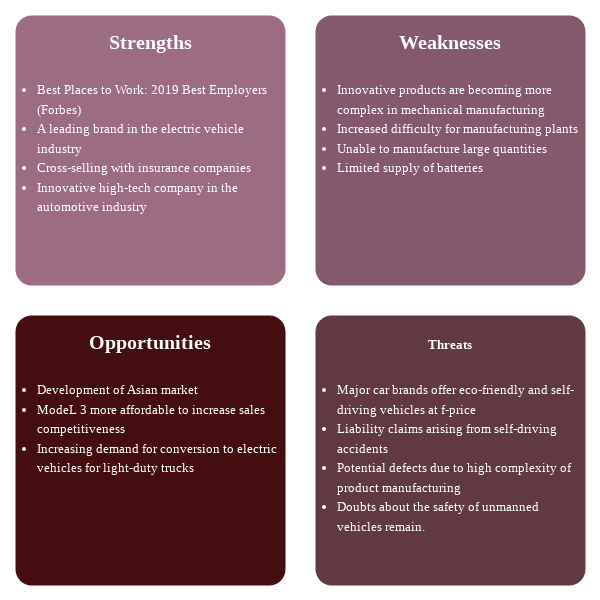
Internetowy startup małych firm
Szablon analizy SWOT (heksagon)
Ten post dostępny jest również w Deutsch, English, Español, فارسی, Français, Bahasa Indonesia, 日本語, Portuguese, Ру́сский, Việt Nam, 简体中文 and 繁體中文














